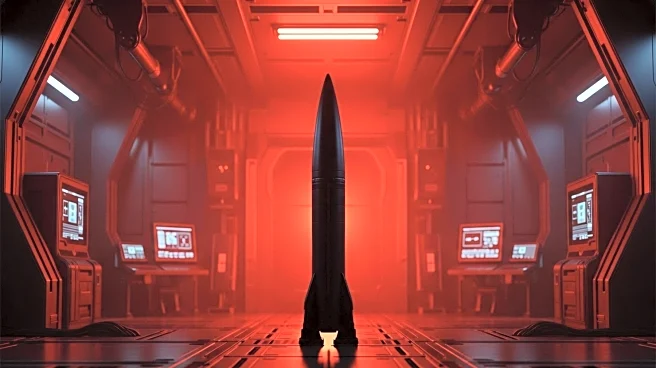What's Happening?
Iran's Revolutionary Guard has issued a warning of a 'deadly' response to any actions taken against the country, following reports of missile tests near Tehran and unusual nighttime military activities. This development comes amid escalating tensions with Israel. The Guard's statement, as reported by state media, emphasized Iran's readiness to seize the initiative on the battlefield if provoked. Reports from Iran International, a London-based opposition media outlet, suggest that the missile tests included the launch of an intercontinental ballistic missile, marking a significant advancement in Iran's military capabilities. Eyewitnesses have reported visible smoke trails from Tehran to several northeastern cities, and social media users have shared images of glowing objects in the sky. Meanwhile, Iranian President Masoud Pezeshkian has vowed to overcome international sanctions, following the UN Security Council's decision to maintain restrictions on Iran. The sanctions are expected to be fully reinstated by September 27.
Why It's Important?
The situation highlights the ongoing geopolitical tensions in the Middle East, particularly between Iran and Israel. The potential for military escalation poses significant risks to regional stability and could impact global oil markets, given Iran's strategic position in the Persian Gulf. The missile tests and Iran's defiant stance against sanctions underscore the challenges faced by international efforts to curb Iran's nuclear ambitions. The reimposition of sanctions could further strain Iran's economy, affecting its citizens and potentially leading to increased domestic unrest. The developments also test the diplomatic strategies of Western nations, particularly those involved in the 2015 nuclear deal, as they navigate the complexities of enforcing sanctions while seeking to prevent further escalation.
What's Next?
The international community, particularly the UN Security Council and countries involved in the nuclear deal, will likely monitor Iran's actions closely. Diplomatic efforts may intensify to address the potential threat posed by Iran's missile capabilities and to prevent further military confrontations. The reinstatement of sanctions could lead to increased economic pressure on Iran, potentially prompting further retaliatory measures from the Iranian government. Regional actors, including Israel and Gulf states, may also adjust their security postures in response to Iran's military activities.
Beyond the Headlines
The situation raises questions about the effectiveness of international sanctions and the broader implications for non-proliferation efforts. Iran's advancements in missile technology could trigger an arms race in the region, prompting neighboring countries to bolster their own military capabilities. The internal dynamics within Iran, including public sentiment towards the government and its handling of international relations, may also be affected by the economic and political pressures resulting from the sanctions.










